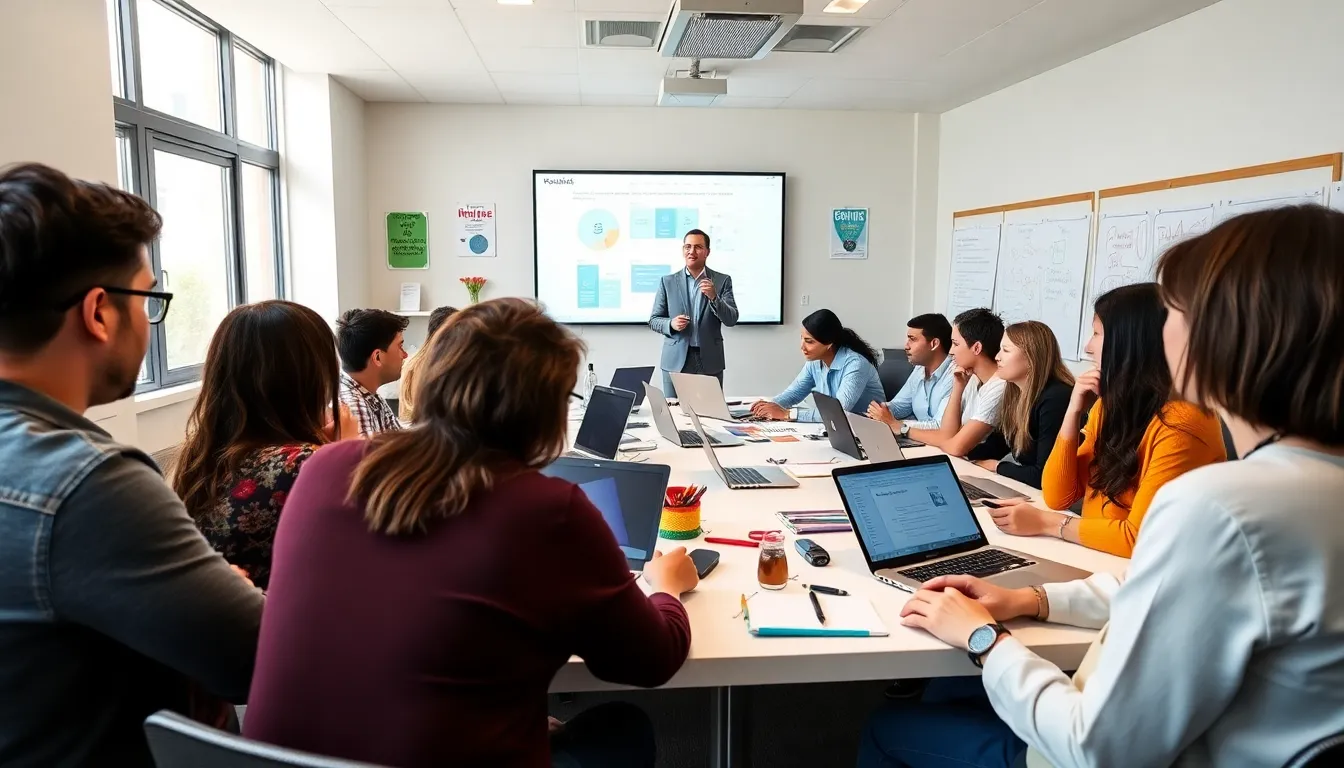Picture this: a room buzzing with energy, people engaged in lively discussions, and ideas flowing like coffee from an overworked pot. This is the essence of workshops. But beyond their lively atmosphere, what exactly do workshops mean? They serve as a unique blend of learning, collaboration, and skill development. Today, we’re going to explore the multifaceted world of workshops, diving into their definitions, types, benefits, and more. Whether you’re looking to attend one or even design your own, this comprehensive guide will equip you with everything you need to know.
Table of Contents
ToggleUnderstanding Workshops

Workshops, in their simplest form, are structured sessions where individuals come together to learn and practice new skills in an interactive environment. Unlike traditional classrooms, workshops emphasize participatory learning, allowing attendees to engage directly with the material and one another.
These sessions can vary widely in scope, from arts and crafts to personal development and technical training. The key characteristic of workshops is that they often prioritize hands-on practice and collaborative projects, fostering a richer learning experience.
Also, workshops typically have a facilitator or instructor who guides the participants through the content. This role is crucial as it ensures the workshop remains focused and that participants gain value from their time.
Besides, workshops can occur in various settings, including community centers, schools, and even corporate offices. The diversity of settings means that workshops are accessible to almost anyone, making them a popular choice for learning in a myriad of contexts.
Types of Workshops
There are many types of workshops, reflecting the diverse interests and needs of learners. Here are a few notable categories:
Educational Workshops
These workshops focus on academic subjects or skill training. They aim to enhance understanding of a particular topic, ranging from math and science to language arts.
Creative Workshops
In these creative settings, participants might explore artistic endeavors like painting, writing, or crafting. These workshops encourage participants to express themselves and often prioritize exploration over formal instruction.
Professional Development Workshops
Designed for career growth, these workshops help individuals enhance their skills and advance their careers. They may focus on leadership, communication, or industry-specific knowledge.
Technical Workshops
These workshops cater to specific technical skills, often relating to fields like IT, engineering, and design. Participants gain practical experience through hands-on activities.
Team-Building Workshops
Many organizations conduct these workshops to improve teamwork and collaboration among employees. They often involve activities and challenges that foster trust and communication.
Each workshop type has unique features and benefits, catering to different audiences and learning objectives.
Benefits of Attending Workshops
Attending workshops can offer a plethora of benefits, particularly for those keen on personal and professional growth.
Networking Opportunities
Workshops frequently bring together individuals from varied backgrounds sharing a common interest. This creates an excellent opportunity for networking, enabling participants to build relationships that can lead to collaboration, mentorship, or even job opportunities.
Practical Experience
One of the standout advantages of workshops is the hands-on experience they provide. Unlike traditional learning environments, workshops allow participants to apply their knowledge in real-time, leading to a deeper understanding of the subject matter.
Skill Development
Workshops are designed to enhance specific skills, whether it’s mastering a new software tool or developing a creative talent. Participants walk away with tangible skills that can be applied immediately.
Enhanced Engagement
The interactive nature of workshops promotes higher levels of engagement compared to lectures. Participants are more likely to feel invested in their learning experience when they actively contribute.
Immediate Feedback
In workshops, immediate feedback from instructors and peers can enrich the learning experience. This real-time input allows participants to correct mistakes and optimize their skills on the spot.
How to Choose the Right Workshop
Choosing the right workshop can significantly influence your learning experience. Here are some key factors to consider:
Define Your Goals
Before diving into workshop options, it’s important for individuals to clarify their learning objectives. Are they looking to enhance a specific skill, explore a new hobby, or develop professionally? Knowing their goals will guide their selection process.
Research the Facilitator
The experience and reputation of the workshop facilitator can make or break the event. Participants should look for facilitators with relevant expertise, positive reviews, and an engaging teaching style.
Consider the Format
Workshops can vary in format, some are in-person, while others are virtual. Participants should consider which format will best suit their learning style and schedule.
Assess the Content
Reading the workshop description closely helps individuals understand what to expect. They should look for details about the curriculum and ensure it aligns with their goals.
Budget and Location
Finally, practical considerations like cost and accessibility should not be overlooked. Individuals may want to choose workshops that fit their financial constraints and are conveniently located.
Designing Effective Workshops
Designing an effective workshop requires careful planning and consideration of various elements.
Identify Objectives
Every workshop should start with clear objectives. The facilitator must outline what the participants should learn or achieve by the end of the session.
Structure the Content
Organizing the content logically helps maintain flow. Incorporating different formats, such as lectures, discussions, and practical activities, can cater to various learning styles.
Prepare Engaging Activities
Interactive activities are crucial for participant engagement. Group discussions, role-playing, or hands-on tasks can enrich the experience and promote collaboration.
Create a Positive Environment
The atmosphere can significantly influence participation. Facilitators should encourage open communication, showing appreciation and respect for all contributions.
Gather Feedback
After the workshop, soliciting feedback helps improve future sessions. Participants’ insights can provide valuable recommendations for refining content or delivery.
Common Challenges in Workshops
While workshops can be powerful learning tools, they are not without their challenges.
Varied Learning Styles
Participants often come with different learning preferences, making it tough for facilitators to cater to everyone. Finding a balance that engages various styles can be a challenge.
Time Constraints
Workshops frequently have limited time for extensive topics. Fitting comprehensive content into a short session can lead to feelings of being rushed or incomplete.
Group Dynamics
Managing diverse groups is another common obstacle. Facilitators might encounter participants with conflicting opinions or varying levels of commitment, which can disrupt the flow.
Resource Limitations
Access to materials and adequate space can sometimes hinder the quality of workshops. Ensuring that all participants have the necessary tools can be essential for hands-on activities.
Overcoming Resistance
Sometimes, participants come with pre-formed opinions about the workshop topic. Facilitators must be adept at handling resistance, encouraging an open-minded approach to learning.
Future Trends in Workshops
As the landscape of education continues to evolve, workshops are adapting to meet new demands. Here are some future trends to watch:
Virtual Workshops
The rise of online learning has opened doors for virtual workshops. These enable participation from across the globe, creating diverse learning environments without geographical limitations.
Integrated Technology
Incorporating advanced technology into workshops is becoming more common. Tools like virtual reality can provide immersive learning experiences, enhancing engagement and understanding.
Focus on Soft Skills
The importance of soft skills like communication and adaptability is trendier than ever in professional settings. Workshops focusing on these skills are likely to gain popularity as organizations prioritize holistic development.
Hybrid Models
Combining both in-person and online elements can cater to a larger audience and provide flexibility. This hybrid model allows individuals to choose how they engage with the material.
Personalized Learning Paths
As workshop facilitators gain insights into the specific needs of participants, personalized learning paths may increase. Tailoring content to meet individual objectives will likely enhance the overall learning experience.



